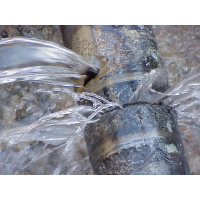Water Agencies Don't (Want to) Know How Much Their Pipes Leak

Hey, water agencies! Your pipes are leaking.
The UCLA Institute of the Environment and Sustainability thought it necessary to make that point in a report (pdf) released last week because the authors’ survey of 10 anonymous water retailers in the Los Angeles region and found they grossly underestimated how much leakage their was and didn’t properly measure for it.
“It appears that most retailers don’t think of minimizing leaks and breaks as a conservation responsibility, despite the cost and scarcity of water in California,” co-author Madelyn Glickfeld said. “States such as Georgia, Washington and Texas actively encourage and train water agencies in conducting water system audits, but not California.”
It’s stuff like this that drives conservationists wild in the Age of Drought. Desalination plants are built, urban trees are allowed to die, ecosystems are drained and groundwater is overpumped before an effort is made to plug leaks.
The survey found that six out of 10 retailers combined leaks with unbilled or unauthorized water use in accounting for missing water. The four retailers that do measure leaks separately reported numbers three times better than the world champion of leak stoppers: Israel.
The water agencies claimed that leaks cost them 3-4% of their supply. UCLA researchers called that “improbably low.” Israel reports a 10% water-loss rate and Australia, a pioneer in drought technology, says 10% is about as good as it gets.
Only three out of 10 retailers used leak detection technology. Just six had a program to replace a certain amount of pipe each year as part of a regular maintenance schedule, but it took between 100 and 330 years for those schedules to include every pipe.
The situation is not much different up north, where the researchers did not venture. Sacramento’s Department of Utilities General Manager Rob Roscoe told the Sacramento Bee he estimated that they lost 10% of their water through leaks, but admitted, “We don’t know exactly where we are until we’re fully metered.”
Roscoe said, ““We don’t know if we’re over 10 percent. We could be. We could be at 1 percent.” That’s doubtful.
The state does not require water agencies to report leaks and, consequently, not a lot do. Senate Bill 555, introduced by state Senator Lois Wolk (D-3rd District), would change that. The bill, already passed by the Senate, requires urban retail water users to submit annual water loss audit reports beginning in 2017. And they can’t just make stuff up.
They have to use a method adopted by the American Water Works Association in the third edition of Water Audits and Loss Control Programs Manual M36 and AWWA Free Water Audit Software version 5.0, according to a legislative staff analysis of the bill.
Then the state will be able to consider an answer to a question the staff posed for itself in the bill’s analysis. “Is water loss a real problem?” Their answer, so far: “It’s hard to know” because, according to the 2013 California Water Plan, in its discussion on urban water use efficiency:
“Not all water suppliers perform regular water loss audits. If water audits are not conducted, it is difficult for a water agency to know the extent of its losses and unlikely that the agency will implement practices to reduce these losses.”
It’s almost time to find out what that steady drip, drip, drip amounts to.
–Ken Broder
To Learn More:
California Water Agencies Don’t Know How Much Their Pipes Leak, UCLA Report Finds (by Alison Hewitt, UCLA Newsroom)
Nearly 1 in 10 Gallons of Water Disappears in Sacramento (by Ryan Sabalow, Sacramento Bee)
Water Distribution System Efficiency: An Essential or Neglected Part of the Water Conservation Strategy for Los Angeles County Water Retailers? (by Kartiki S. Naik and Madelyn Glickfeld, UCLA Institute of the Environment and Sustainability) (pdf)
- Top Stories
- Controversies
- Where is the Money Going?
- California and the Nation
- Appointments and Resignations
- Unusual News
- Latest News
- California Forbids U.S. Immigration Agents from Pretending to be Police
- California Lawmakers Urged to Strip “Self-Dealing” Tax Board of Its Duties
- Big Oil’s Grip on California
- Santa Cruz Police See Homeland Security Betrayal in Use of Gang Roundup as Cover for Immigration Raid
- Oil Companies Face Deadline to Stop Polluting California Groundwater





